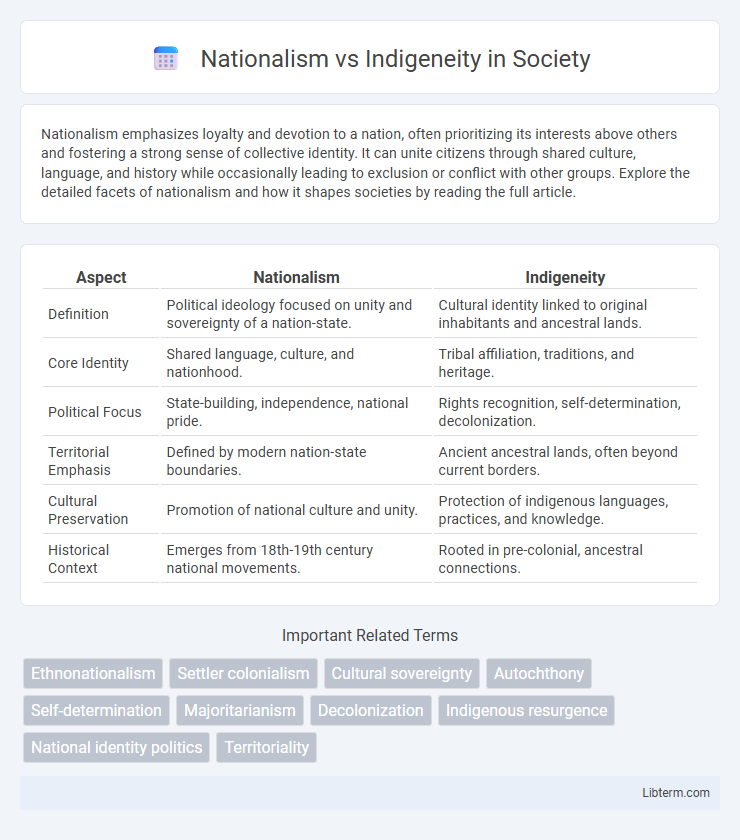Nationalism emphasizes loyalty and devotion to a nation, often prioritizing its interests above others and fostering a strong sense of collective identity. It can unite citizens through shared culture, language, and history while occasionally leading to exclusion or conflict with other groups. Explore the detailed facets of nationalism and how it shapes societies by reading the full article.
Table of Comparison
| Aspect | Nationalism | Indigeneity |
|---|---|---|
| Definition | Political ideology focused on unity and sovereignty of a nation-state. | Cultural identity linked to original inhabitants and ancestral lands. |
| Core Identity | Shared language, culture, and nationhood. | Tribal affiliation, traditions, and heritage. |
| Political Focus | State-building, independence, national pride. | Rights recognition, self-determination, decolonization. |
| Territorial Emphasis | Defined by modern nation-state boundaries. | Ancient ancestral lands, often beyond current borders. |
| Cultural Preservation | Promotion of national culture and unity. | Protection of indigenous languages, practices, and knowledge. |
| Historical Context | Emerges from 18th-19th century national movements. | Rooted in pre-colonial, ancestral connections. |
Defining Nationalism and Indigeneity
Nationalism is a political ideology centered on the interests, culture, and identity of a defined nation, often seeking self-governance or sovereignty for a group unified by shared history and language. Indigeneity refers to the status and identity of Indigenous peoples as original inhabitants of a region, emphasizing ancestral ties, cultural continuity, and distinct social and political systems predating colonial states. While nationalism often constructs a collective identity based on territorial boundaries and political unity, indigeneity prioritizes ancestral connection and cultural preservation within or beyond those boundaries.
Historical Roots and Evolution
Nationalism and indigeneity both stem from deep historical roots, shaping collective identities through time. Nationalism emerged primarily from 18th-century European state-building efforts, emphasizing shared language, culture, and political sovereignty. Indigeneity, however, originates from ancestral connections to specific territories predating colonial boundaries, evolving as a resistance to external domination and reclamation of cultural heritage.
Key Ideological Differences
Nationalism emphasizes the unity and identity of a population based on shared language, culture, and political sovereignty, often prioritizing nation-state boundaries and collective patriotism. Indigeneity centers on the unique cultural heritage, ancestral land rights, and self-determination of indigenous peoples, emphasizing preservation of traditions and resistance to colonial or state domination. While nationalism seeks to forge a cohesive national identity, indigeneity prioritizes the recognition of distinct group identities and sovereignty rooted in historical presence and cultural continuity.
Political Impacts and Power Dynamics
Nationalism often prioritizes the unity of a nation-state based on shared identity and sovereignty, frequently leading to centralized political power that may marginalize indigenous communities. Indigeneity emphasizes the rights, self-determination, and cultural preservation of native populations, challenging state-centric authority and advocating for political autonomy and reparative justice. The tension between nationalism and indigeneity manifests in political structures where power dynamics determine land rights, resource control, and legislative recognition of indigenous governance.
Indigenous Rights vs. National Interests
Indigenous rights emphasize sovereignty, cultural preservation, and land claims rooted in ancestral connections, often challenging national interests focused on territorial integrity and resource exploitation. Conflicts arise when states prioritize economic development or security over Indigenous autonomy and self-determination. Balancing national unity with Indigenous rights requires legal frameworks that recognize Indigenous governance and protect their cultural heritage within the broader state context.
Cultural Preservation and Identity
Nationalism often centers on unifying a population under a shared national identity, promoting cultural preservation through state-sponsored symbols, education, and heritage policies that reinforce collective belonging. Indigeneity emphasizes the protection and revitalization of distinct indigenous cultures, languages, and traditions, asserting sovereignty and self-determination as essential to identity preservation. Both frameworks engage with cultural preservation, but indigeneity prioritizes ancestral knowledge and community-driven practices over the homogenizing tendencies of nationalism.
Case Studies: Global Perspectives
Case studies on nationalism versus indigeneity reveal complex dynamics where indigenous communities assert their cultural identity and political rights within nation-states shaped by dominant nationalistic narratives. Examples from Canada's Indigenous Land Rights Movement and Bolivia's recognition of indigenous autonomy demonstrate varying degrees of state accommodation and conflict over sovereignty. Comparative analysis of Australia's Aboriginal self-determination and India's Adivasi movements highlights challenges in balancing national unity with the protection of indigenous heritage and legal status.
Intersectionality and Social Movements
Nationalism and indigeneity intersect in complex social movements that emphasize identity, sovereignty, and cultural preservation, highlighting the multifaceted nature of intersectionality as it relates to race, ethnicity, and political power. Social movements such as Indigenous rights campaigns and nationalist uprisings often navigate overlapping issues of colonialism, systemic inequality, and cultural activism, illustrating how intersectionality shapes collective resistance. Understanding these dynamics reveals how grassroots mobilization addresses both national unity and Indigenous autonomy within broader frameworks of social justice and human rights.
Challenges to Reconciliation
Nationalism often prioritizes a unified national identity which can marginalize indigenous peoples' unique cultures and rights, posing significant challenges to reconciliation efforts. Indigenous communities frequently face systemic barriers to recognition and inclusion, complicating efforts to address historical injustices and land claims. The tension between state sovereignty and indigenous sovereignty demands nuanced dialogue and policy reforms to foster genuine reconciliation and respect for indigenous self-determination.
Pathways to Inclusive Coexistence
Nationalism often emphasizes shared identity based on territory and cultural homogeneity, while indigeneity centers on ancestral connection and self-determination of native peoples. Pathways to inclusive coexistence require recognizing indigenous rights, preserving languages, and integrating indigenous governance within national frameworks. Empowering indigenous communities through legal protections and equitable resource sharing fosters mutual respect and social cohesion.
Nationalism Infographic

 libterm.com
libterm.com